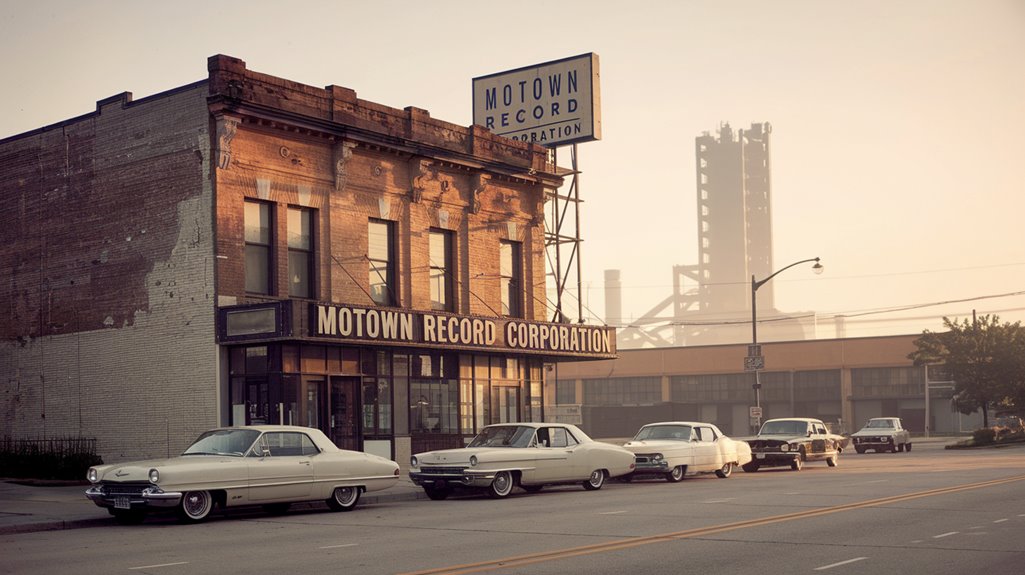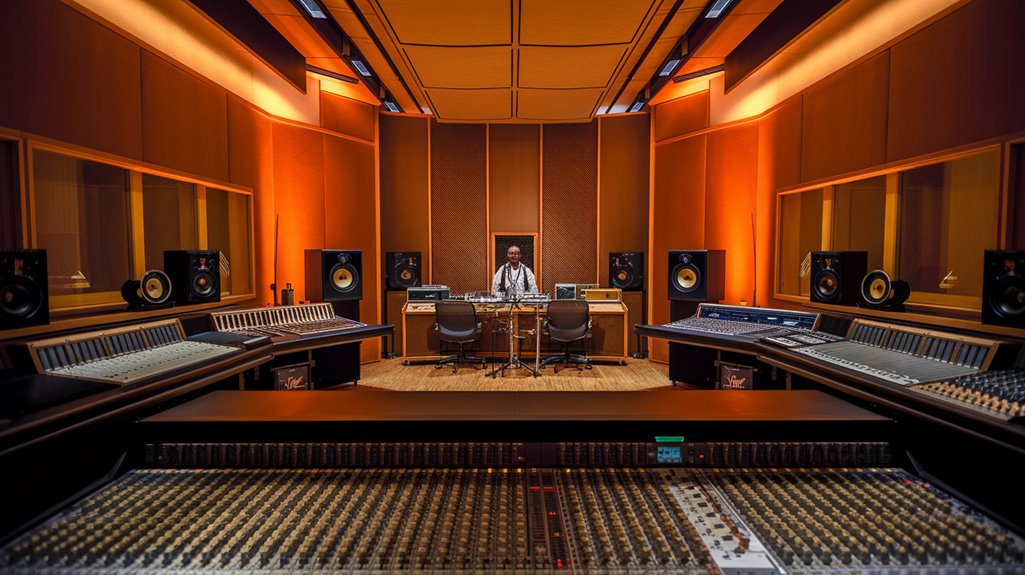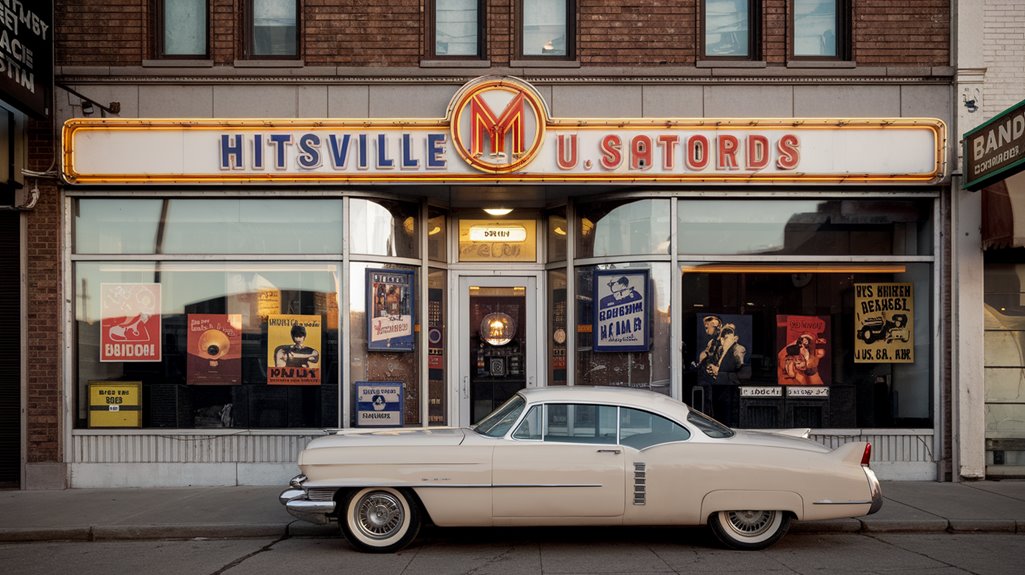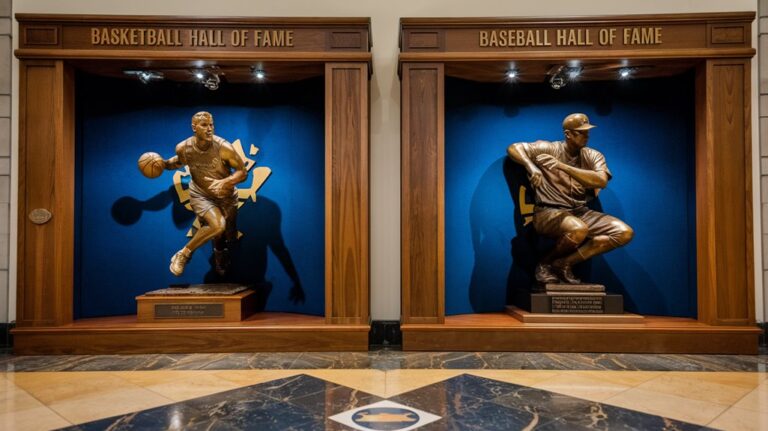Motown’s Name Pays Homage to Detroit’s Automotive Roots
When you hear "Motown," you're connecting with more than just music—you're tapping into Detroit's industrial soul. The name itself tells a story of how Berry Gordy transformed his assembly line experience into a revolutionary music empire. As Detroit's factories churned out cars that would change America's landscape, Gordy's Motown Records was crafting a sound that would reshape its cultural fabric. The intersection of these two worlds reveals an unexpected partnership between manufacturing might and musical magic.
The Birth of an Automotive Empire in Detroit

You'll find that Detroit's automotive innovation began with Ransom E. Olds, who opened the city's first auto manufacturing plant in 1899. That same year, Henry Ford launched the Detroit Automotive Company, though it produced just two cars before closing. He'd later establish the Henry Ford Company in 1901, which became Cadillac Motor Company in 1902.
Detroit's industrial growth accelerated as the city's metalworking expertise in stoves, boilers, and structural steel supported the emerging auto industry. By 1925, these early ventures had evolved into what became known as the Detroit Three automakers, dominating the American automotive landscape. This rich automotive heritage inspired Berry Gordy to name his record label Motown Records in 1959.
Berry Gordy: From Assembly Line to Music Mogul
Detroit's automotive heritage shaped more than just the city's industrial landscape – it revolutionized the music industry through an unlikely innovator. Berry Gordy's experience at Lincoln-Mercury's assembly line would transform how music was produced forever.
With just an $800 family loan, Gordy's vision was clear: apply automotive production techniques to create hit records.
You can see the assembly line influence in how he structured Motown Records, founded in 1959. Just as cars started as frames and emerged complete, raw talent entered Motown and emerged as polished stars.
He organized specialized departments for songwriting, production, and performance, creating an efficient hit-making machine. This innovative approach worked brilliantly – The Miracles scored Motown's first R&B hit with "Shop Around" in 1960, setting the stage for decades of success. The strategy proved phenomenally successful, as Motown went on to produce an incredible 35 number one hits between 1961 and 1973. The label's roster featured many unknown local performers who became legends, including Mary Wells and the Temptations.
The Story Behind the Motown Name
A cultural revolution began with a simple name that captured Detroit's industrial spirit. When Berry Gordy founded his record label in 1959, he drew inspiration from his hometown's reputation as the heart of America's auto industry. The Motown origins can be traced directly to Detroit's nickname "Motor Town," which Gordy cleverly abbreviated to create his company's iconic name.
This Detroit influence wasn't just symbolic. Having worked at Ford's foundry and Lincoln-Mercury's production line, Gordy understood the power of efficiency and systematic production. Starting with just $800 investment, he built one of the most successful Black-owned businesses in America.
He'd later apply these automotive industry principles to create hit records, transforming Tamla Records into the legendary Motown Record Corporation. You can trace his automotive background in everything from the label's name to its assembly-line approach to making music, creating a sound that would change American culture forever. His vision of promoting Black artists while appealing to audiences of all races would prove revolutionary.
Detroit's Motor City Legacy
The birth of America's automotive industry transformed a modest Midwestern city into a global manufacturing powerhouse. From Henry Ford's establishment of the Detroit Automobile Co. in 1898 to the rise of the Detroit Three, you'll find automotive innovation woven into every aspect of the city's DNA.
The humble beginnings started with self-taught mechanics who laid the groundwork for Detroit's automotive empire. Detroit's industrial evolution reached its peak in the 1940s when Ford, GM, and Chrysler dominated 90% of the U.S. market share. President Bush's bailout in 2008 provided $17.4 billion to help save GM and Chrysler from collapse.
However, you can trace the city's challenges to the late 1940s, when manufacturing jobs began moving to the suburbs. The oil crises of the 1970s and the 2008 financial crisis dealt further blows, leading to historic bankruptcies and bailouts.
Yet Detroit's Motor City legacy endures, and the revival of its automotive industry signals the city's resilient spirit.
How Auto Industry Principles Shaped Music Production

Inspired by Detroit's automotive assembly lines, Berry Gordy Jr. revolutionized music production by implementing factory-like efficiency at Motown Records.
You'll find the same principles that made Detroit's auto industry successful reflected in Motown's approach to assembly line music production.
Just as car manufacturers divided tasks among specialized workers, Motown assigned specific roles to writers, producers, and performers.
The label's sound engineering process mirrored automotive quality control, using radio box testing to guarantee songs sounded perfect on car radios.
The legendary Funk Brothers musicians played on more number one hits than The Beatles, Elvis Presley, The Beach Boys, and The Rolling Stones combined.
Before founding Motown, Gordy worked at the Ford Motor Company, where he gained insights into efficient production methods.
They'd evaluate each track through simple one-way speakers, optimizing the sound for AM radio playback.
Motown's vertical integration meant they controlled every aspect of production, from writing to distribution, just like Detroit's automakers managed their entire manufacturing process.
This systematic approach created a hit-making machine that transformed the music industry forever.
The Cultural Bridge Between Cars and Music
Detroit's automotive legacy extends far beyond assembly lines and manufacturing processes, weaving deeply into the city's musical fabric.
Henry Ford's assembly line production methods transformed Detroit into America's manufacturing powerhouse, setting the stage for its musical revolution.
You'll find car culture influencing everything from blues lyrics to techno beats. This unique fusion sparked musical innovation across multiple genres, creating a distinctive Detroit sound that resonates with the city's industrial pulse.
- Musicians like John Lee Hooker incorporated automotive themes into their blues compositions.
- Motown deliberately engineered its songs to sound perfect on car radios.
- The city's industrial rhythms influenced the birth of Detroit techno.
- Artists like Bob Seger and Suzi Quatro drew inspiration from the Motor City's automotive heritage.
The interplay between Detroit's automotive identity and its music scene created a cultural synergy that's uniquely American. In 1959, Berry Gordy Jr. established Motown Records, naming it after Detroit's "Motor City" nickname.
You can hear the city's mechanical heartbeat in its music, from the smooth harmonies of Motown to the electronic pulse of techno.










